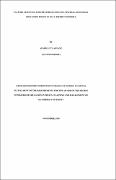| dc.description.abstract | This study was carried out in secondary schools in Gulu district in northern Uganda in
Government secondary schools. The purpose of the study was to establish the factors
affecting the implementation of USE in Gulu District. The main objectives of the study were
to examine; how teaching and learning are affected under Universal Secondary Education
policy; how school funding is affected by Universal Secondary Education policy and how the
participation of the community affects the implementation of Universal Secondary Education
policy. A cross sectional research design was used in which a representative samples of 300
participants across the population of head teachers, teachers, BOG, students, DEO, inspectors
of school were involved and quantitative data was analyzed by use of frequency distribution
and percentages. While qualitative data was categorized in accordance with themes. The
study established that the teaching and learning under USE has not been effective because
teachers do not keep time for their lessons, teachers do not give tests and examinations as
scheduled, teachers do not release, teachers teach many classes with a huge number of
students in class. The study also found out that the school funding under USE has not been
good because the grant is not sent in time, it is not enough, there is improper management of
the grant by the school administrators and teachers do not receive salaries and allowances on
time. However, the study also established that there is a high level of community
participation under the USE policy because the community participates in school activities. It
is therefore recommended that the community at large should support construction of more
school by providing land and labor to reduce high enrollment rates in the existing schools in
the Gulu District. Consequently, government should employ enough teachers so as to cater
for the rising number of secondary school students in the District. | en_US |

